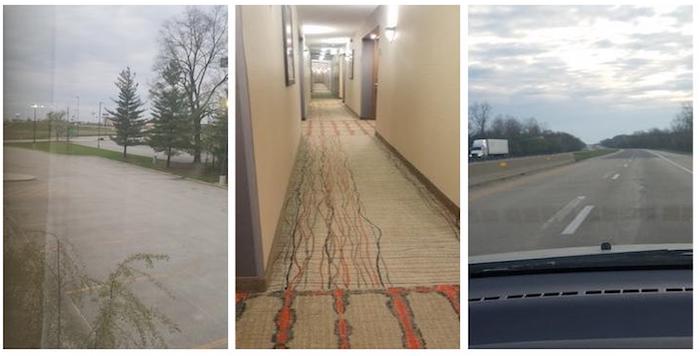
Janet Sassi
The big empty: A hotel parking lot and hallway and virtually barren highway on an interstate trek during the COVID-19 crisis.On the week I left New York City to spend three months in Santa Fe, Feb. 16, if you’d asked the average American what COVID-19 was, he’d likely guess it was a pain killer or sleeping pill, like an NSAID or a TEVA 54. Those Americans who pay attention to news may have heard ‘COVID-19’, but shaken their heads. It was the Others in Wuhan, China who had to be quarantined, thinking it’s there, not here.
The thing with a pandemic is that it moves so quickly you don’t have time to wrap your head around it.
By the third week in March, my home city is the epicenter of America’s outbreak. I begin to get notices from our proactive New York City building that there is a sign-up sheet for tenants to take turns bleaching down elevator buttons, doorknobs, bannisters and delivery boxes. My partner had left the city on March 1 for his Long Island house, and is now complaining that every other New Yorker is showing up. Then, on March 31st, when the hospitals in New York were overrun, the death toll was out of control, folks had lost their jobs, patients had to split ventilators due to a shortage, and he’d gone out and bought a gun, he gives me a sage ultimatum.
“Either come home now,” he tells me, “Or shelter with your daughter ‘til this is over.”
I leave on Maundy Thursday, hoping a holiday weekend keeps people home and off the roads. Turns out I don’t have to worry. Except for truckers, the roads are empty. I’m talking vastly empty. I am reminded of the Danny Boyle film 28 Days, in which a virus decimates London and vigilante groups decide it’s okay to rape women. For long stretches of highway through New Mexico, Texas and Oklahoma, I see few cars, and almost exclusively local license plates.
Before I’d left Santa Fe, I’d covered my New York license plates with my car’s original set of Wisconsin plates (I’d inherited the car from my midwestern mom). In the heartland, there’s an irrational dislike of East Coasters, especially New Yorkers, and I considered that some Trump-addled American might blame my New York car for the virus and vandalize it (This may seem irrational, but Leprosy was once considered a punishment from God and a call for a stoning.)
I drive faster than normal and spend longer hours on the road. In some states, rest stop exits are blocked off with police tape. In others, rest stops have become respites for traveling truckers to pull off and spend the night in their cabs. If I wasn’t a single female, I, too, might sleep in my car.
 CityViews are readers’ opinions, not those of City Limits. Add your voice today!
CityViews are readers’ opinions, not those of City Limits. Add your voice today!
Outside of cities, the bathrooms in food takeout places are mostly closed, or else they’re dicey. So I pee more than once on the side of a highway exit or entrance ramp. Entire travel oases, normally offering a half-dozen food vendors, are on Life Support, staffed with maybe two people –one to cook you a burger and clean the counters and the other to take your money and empty trash bins.
The motels are like the roads, only emptier. I enter a Holiday Inn lobby in Missouri. A small drinking glass sits on the countertop, with a sign that reads ‘credit card here’. Next to it is a plastic basket reading ‘sanitized pens’. There is painter’s tape on the floor marking off 6 feet back from the counter.
“Am I the only one sleeping on the 2nd floor?” I ask the hotel attendant, who hesitates before she shakes her head no. Up on the floor, the hallway is quiet and eerie, like the hotel from The Shining. I look into the parking lot at my lone car and think ‘redrum.’
In an Indiana motel, the desk clerk assigns me a handicap-fitted room. I figure it’s because it is close to the front desk, but enjoy the realization that it’s also quite EMT-accessible.
When entering a hotel room, assume it has COVID. In each new place, take a washcloth, wet it with a bottle of spray bleach solution and wipe down everything – microwave, fridge, remote, tv, light switches, faucets, etc. There are the strange pillows and sheets, but you’ve got to trust them as well as the questionable carpets. This whole experience reminds me of maneuvering an obstacle course for boot-camp training, trying to avoid invisible bullets. Breakfast is a take-away bag with an orange, muffin and Nutri-bar. Don’t touch that bag…
This might be the only time in my life that I say this, but Thank God for McDonalds. They’re ubiquitous with the road, and though some of their bathrooms are also closed, their takeout windows are not. I wait in a drive-thru line for 20 minutes to get coffee and an order of fries. The window server tells me ‘have a nice day’ and I crave the interaction, even though I can only imagine his smile beneath the mask.
At a gas station, a young trucker gets out of his cab, shakes out a blanket, and changes his t-shirt.
“Been driving straight for 16 days and four deliveries,” he says. “Making good time and good money. Love these lonesome highways!”
Except, he said, he can’t take a day off, not even Easter.
As I travel eastward, gas rises from $1.09 a gallon in Oklahoma to $2.15 a gallon in New Jersey and the number of trucks on the road increases. Holding gas pumps, inserting credit cards, wiping windshields—they’re all minefields of infection, as they’re touched by hundreds of hands. I squeeze into latex gloves 10 times a day and wash them out at night, because who knows when Amazon will get in new stock?
I drive into the city via I-95 and finally glimpse the New York skyline. There is such scant traffic that ‘stay in your lane’ seems meaningless. I pass a derelict car and wave – those of us on the roads have an oddball camaraderie – before reaching the George Washington Bridge, a dependable bottleneck. Today, I breeze right through.
Only when I’m safely home in self-quarantine does the experience hit me. Wiping down my credit card with alcohol. Eating microwaved dinners. Squeezing into surgeon’s gloves to open a bathroom stall or flush. Driving along a mighty concrete highway that’s now basically empty of those who poured it. America, the land of the free, has imprisoned itself to survive. The cultural symbol of the big car on an open road now seems collectively booted, our Lost Highway.
We are neither mightier than God nor Mother Earth. If COVID-19 cannot teach us that, what can?
Janet Sassi is an author who works in academic communications.



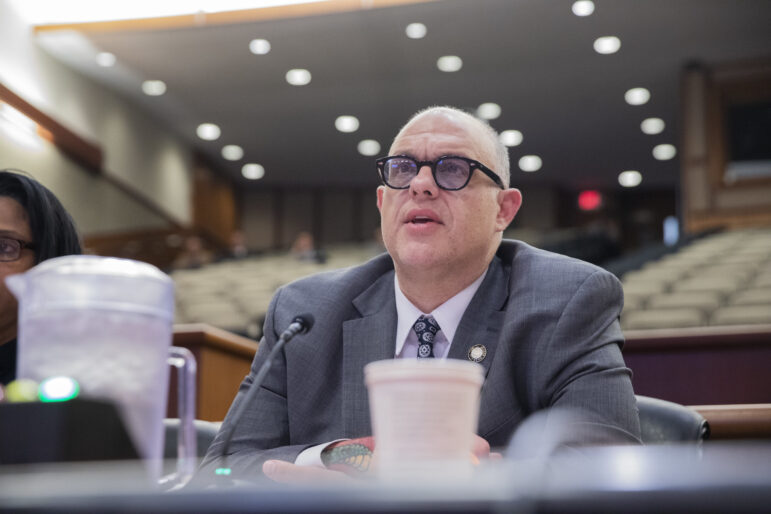
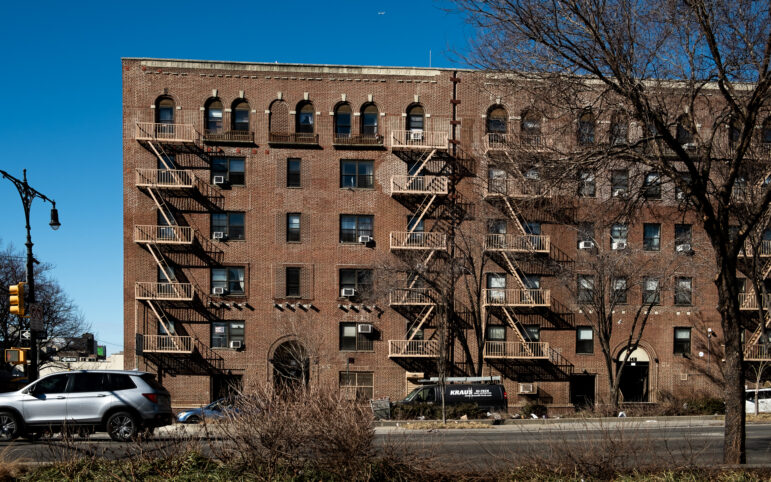
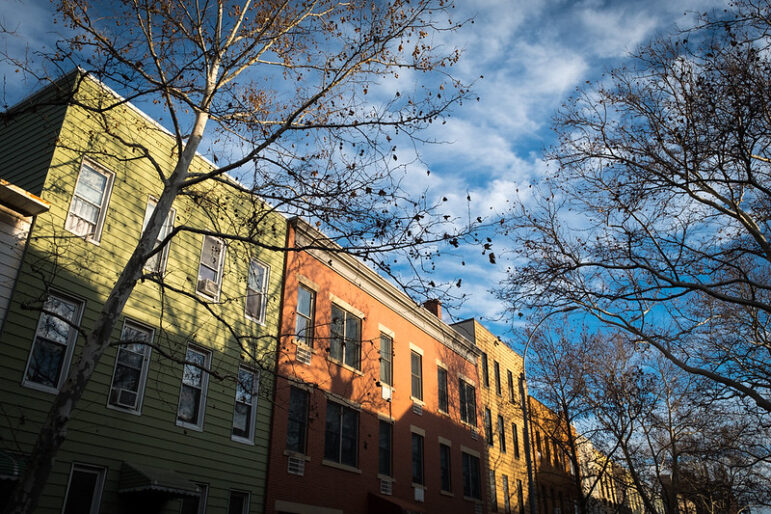
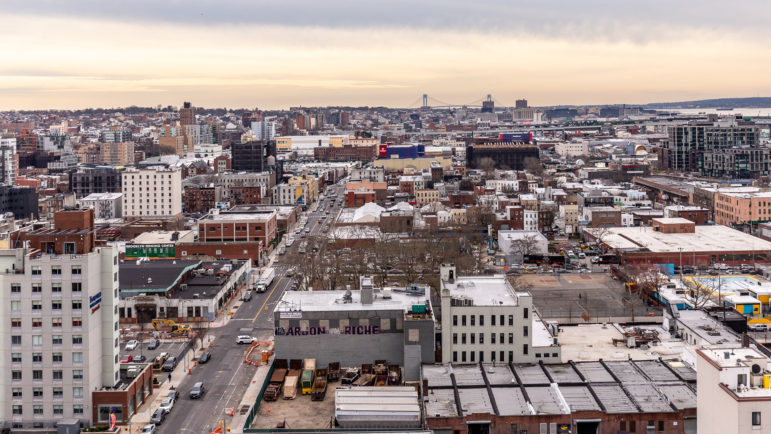


One thought on “Crossing a COVID Nation: Our Lost Highway”
Very moving account, iconic of the bizarre dystopian world we find ourselves in. Generations from now will look back on first person stories like this to explain the evolution of their new world.